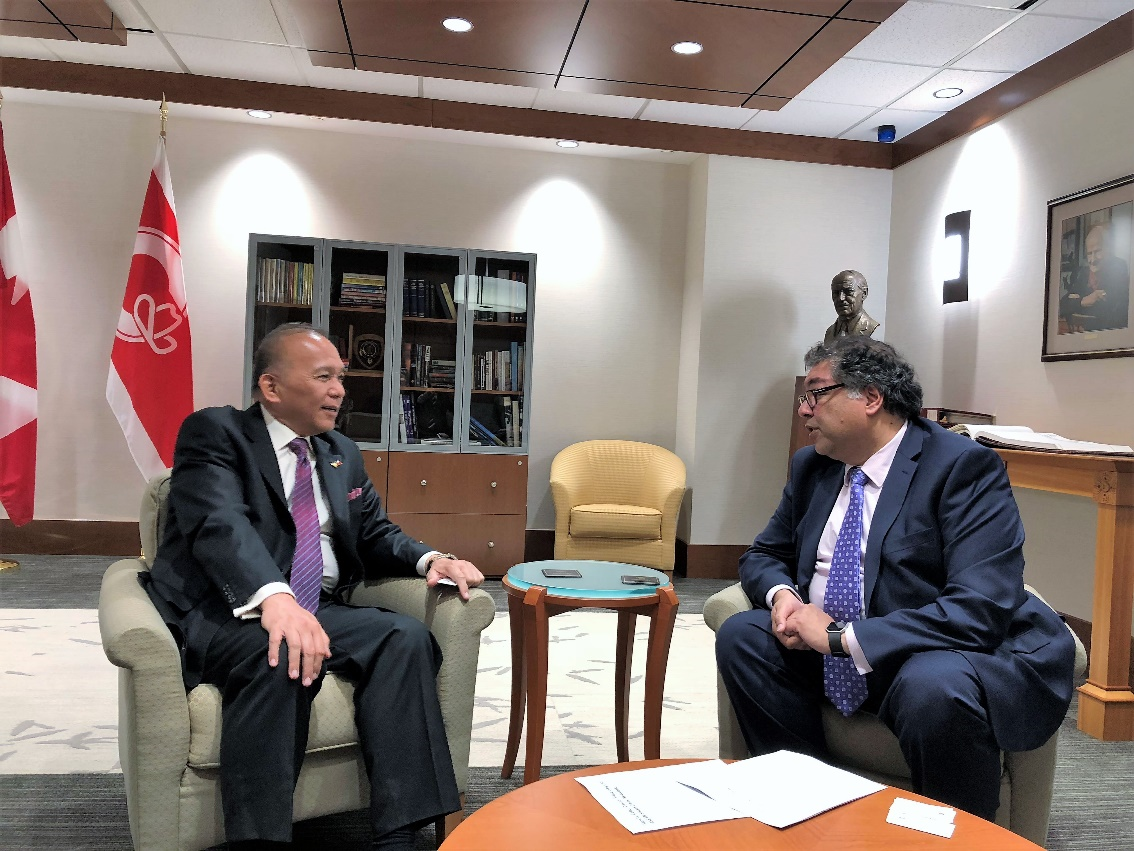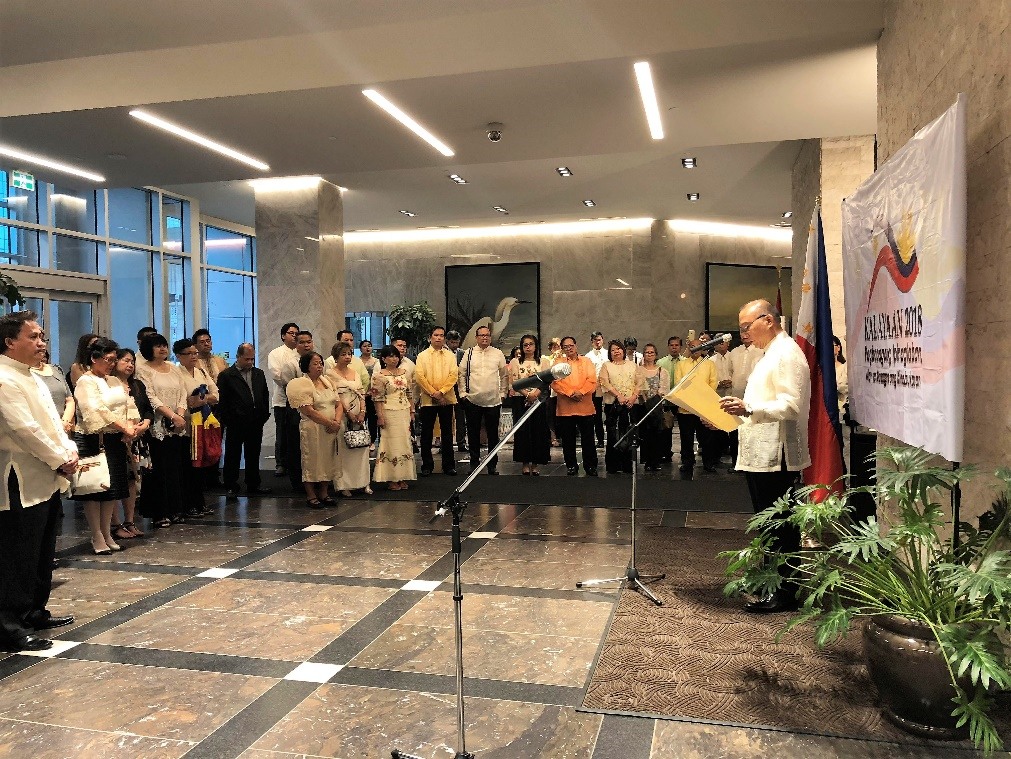It takes guts, a lot of real determination, and maybe unstoppable passion to make a decision to switch careers.
This is especially true when the gains of the present have been crystal clear while the prospects of the new one remain unexplored. But sometimes fate has a way of playing its way around our lives. The transition can be initiated by what we witness, experience, or come to love in the course of doing an old job.
Consul General Bert Asuque of Calgary found his way into the foreign service while into a glamorous job of covering Malacañang happenings as a Palace reporter of the government channel, PTV4 in the ‘70s. One of these regular events, he said, was the presentation of credentials by ambassadors of different countries. This ceremony fascinated him so much that he began dreaming of becoming a diplomat one day.
As many people may realize, his was a kind of dream that cannot happen overnight. A lot of planning and consultation with friends and family went into the good ConGen’s process of decision-making. But he had it all figured out. While still a TV news anchor, he returned to school and studied at University of the Philippines (UP) College of Law.
After a successful career in broadcast journalism from 1972 to 1986, he knew all he ever wanted was to join the foreign service. While still studying law, he took the foreign service exam and passed it. He finished his law degree and immediately joined the Department of Foreign Affairs (DFA) and became spokesperson under its Public Information Services; then as assistant secretary in the same department.
The Foreign Service Exam
While we were at this topic, ConGen Asuque remarked that the process of taking the prestigious foreign service examination should be an exercise that some young people must experience. He recalled that it consisted of a battery of exams and interviews which one must pass to be eligible to take the written tests. Written exams are taken in one week and all those who pass will be feted in a formal dinner where topics will be drawn by lots and the examinee is asked to deliver a formal speech based on the subject matter he picks. In his batch, out of 500 hopefuls, only 15 made it to the finals.
He informed that the exam is open to all graduates regardless of what discipline they come from. There are those who come from Foreign Service bachelor’s degrees but what is important is for an applicant to be abreast with economics and international developments as well as exhibit an excellent writing skill. Specifically, he pointed out that, one must have “the ability to analyze, synthesize and write this down into a cohesive answer.” In his case, he said it was just fortunate that at the time he took it, he had behind him years of experience in broadcasting where he was honed in research, evaluating, and writing. He also had a fresh degree from the UP College of Law and so the exam was just like a piece of cake to him. Or maybe, we would think.
“At the Malacaňang Press Office, there was like a library where I would go all the time after my work to keep reading and learning,” he recalled, implying that if we are really passionate about something, we really should take effort educating ourselves. Though his journalism background worked to his advantage, as mentioned, the ConGen still went back to school to arm himself further with enough knowledge and solid credentials to aim for a slot at the Foreign Service.
Having proven to himself how education and actual exposure to a field or industry make up a surefire formula to journey into success, ConGen Asuque is currently into a project that aims to give young students from the Philippines a chance to come to Calgary and get more advanced knowledge and training in areas like mining, agriculture, and economics. ConGen Asuque and Deputy Consul General Zaldy Patron are working towards the signing of a Memorandum of Understanding between Philippine universities and the University of Calgary and University of Alberta to offer scholarships and other training opportunities for Filipino undergraduate or past-graduate students. This project will require meetings with CHED and UP, initially, as to how this agreement can be actualized.
Looking After Filipino Engineers, Geologists
With equal fervor, he vowed to try to protect the future of our Filipino engineers and geologists and others who have landed in Alberta with the hope that they can get into its rich oil and mining industries. He noted that these two (2) industries are not doing so well at the moment, specifically affected by the much-delayed pipeline project. The good ConGen was referring to the TransMountain Pipeline Project if when built, will give a more direct route for Alberta oil to the Asian market.
It can be noted that there are at least three (3) pipeline projects in Alberta. The Northern Gateway is the one that runs from Alberta to BC; the Keystone – Alberta to Nebraska; and the tripling of the TransMountain that currently runs from Edmonton to BC. The Keystone is the one that is reportedly expected to give international access to Alberta oil. It involves the construction of an approximately 1,179-mile-long pipe from Alberta to Nebraska and is estimated to provide over 42,000 temporary jobs over its one to two-year construction. However, both the TransMountain and the Keystone projects have difficulty moving forward as they have sparked controversies among environmental activists and other NGOs who believe that it would run over or through some indigenous lands and large private properties, among other arguments.
ConGen Asuque also admits that it is not only our engineers who are having problems with recognition or accreditation of professional credentials. And just like the ConGens of Vancouver and Toronto, PCG Calgary continues to make representations with the federal government and works with NGOs to come to a happy resolution of this old issue. Admittedly, not today or tomorrow, but hopefully sometime in the foreseeable horizon for the benefit of the Filipinos in Calgary. After all, the PCG is a creation of the Filipinos in Alberta, who earnestly petitioned the Philippine government to set up this office in 2015. It became a reality in 2016 and was first headed by Ambassador Julius Torres, until May 2018 when ConGen Asuque took over from him.
Being in the middle of critical and important issues is not new to ConGen Asuque. He was part of the legal team that studied and prepared the Memorial (legal arguments) for the Scarborough Shoal and West Philippine Sea problem with China, and one of those most pleased with the decision of the 5-member Arbitral Tribunal in favor of the Philippines. With his thorough background in shipping and maritime law, he was once appointed assistant secretary of the DFA for maritime and ocean concerns. This author, however, did not think it was politically correct to ask the good ConGen what he feels about this maritime issue today when the current administration seem not keen at all in embracing the victory gained from this high-profile case.
As a diplomat, ConGen Asuque, however, sees himself as “part of national team that works to bring the vision of the national government to Filipinos around the world. The President of the Republic is the head of the team, the coach and the influencer of foreign policies. The Secretary of Foreign Affairs, through the DFA, implements these foreign policies.”
Pillars of Foreign Service
He explained that today, the pillars of foreign service are 1) national security,
2) economic diplomacy, and 3) assistance to Filipino nationals overseas. The consular office as an extension of the DFA in different parts of the globe, will be there to roll out these objectives, especially ensuring that Filipinos abroad are accorded the service they deserve.
The PCG in Calgary whenever given the chance to join community events, takes time to educate Filipino immigrants or Filipino Canadians on some aspects of Philippine laws that affect or still affect them even while abroad. One such issue, he mentioned, is on Philippine citizenship. When does it end? When does it continue? What am I entitled to as someone born in a foreign country, or someone who had acquired citizenship of another country?
ConGen Asuque cited the example of a child who was born in Canada while his Filipino mother or father or both parents are still immigrants. In this case, by the principle of jus sanguini (right of blood) which the Philippines follows , as opposed to jus soli (right of soil) followed by other countries like US and Canada, the child is a Filipino citizen and entitled to a Philippine passport, he said.
The good ConGen could go on and on, and we would notice the endearing enthusiasm in his voice in discussing about issues and the passion to bring these issues into a resolution. This is an attribute, we believe, that had carried him through in his broadcast journalism and foreign service careers successfully. Something we will be assured of wherever his tour of duties will take him.
Canada’s Calming Effect
Tour of duties was not limited to a consular head position. Before becoming the ConGen of Calgary, he was the Deputy Chief of Mission and Permanent Representative of the Philippines to the International Maritime Organization (IMO) and Related Inter-Governmental Organizations, at the Philippine Embassy in London, from 14 March 2016 to 30 April 2018. He also served as Spokesman of the Department of Foreign Affairs from 2004-2006. Other important assignments took him to London, Australia, Tokyo, Israel as Chargé d Affaires a.i. and Consul General in Tel Aviv and Lebanon as Philippine Ambassador to Beirut.
Canada is relatively more unflustered compared to other crisis-torn countries he had been to, according to ConGen Asuque. In Canada, things are orderly and in place, specifically its immigration procedures, he noted. But having been assigned in countries like Israel and Lebanon gave him real exposure and the chance to learn his craft, not to mention the tenacity to deal with the difficult problems of our nationals, fight for their rights and bring them to justice, if need be.
While this calming Canadian tour-of-duty gives him a prologue on easing into a retirement mode, he is not about to fade into oblivion just of yet. He vows to continue being mentally and spiritually active, and may be more involved with his two (2) grandsons by his two (2) kids – one a doctor, and the other, a professional musician in the Philippines. Wife Rosalie is based with him in Calgary.
For a passionate person like the good ConGen, writing 30 to his busy life is not one journalistic lingo he intends to use for a few more years to come.

